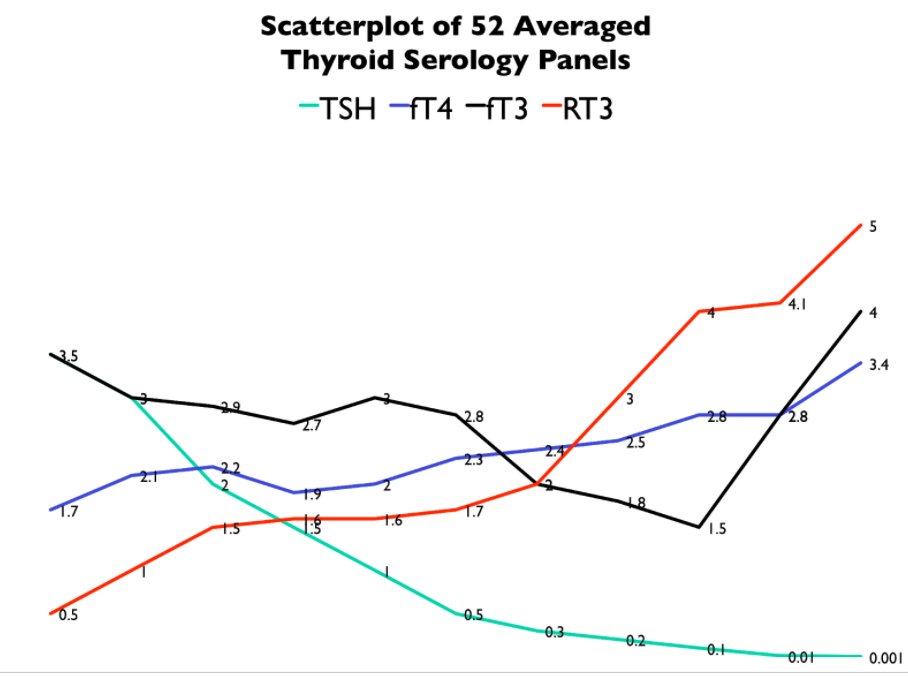Hi Dr. C,
“My functional medicine doctor says my T3 is too low but when he raises my dose my TSH gets too low but my T3 does not go up. What can I do?”
Lorraine
Great question Lorraine,
We can take a step back and ask if your T3 really is too low. You can read more about that here ‘How High Should My T3 Be?’
The rest of this blog will answer your question assuming your T3 is too low.
The issue of low TSH and low T3 comes up a lot. You’d think that adding more T3 would work as a low T3 treatment, but that’s not the case.
Let’s discuss the in-depth reasons behind this complicated process to help you make sense of what your TSH and free hormone levels truly mean.
Read More: Testing Your Thyroid And The Definitive Guide To Optimal Ranges
The Seesaw Relationship Between TSH And T3
You probably already know a bit about how thyroid hormones work. The thyroid makes hormones and secretes them into your bloodstream, where they’re carried to every tissue in your body.
They’re responsible for energy, keeping you warm, and maintaining brain, heart, muscle, and organ function. We call the major thyroid hormones TSH, T3, and T4.
Picture your TSH, T3, and T4 hormones on a seesaw.
When the TSH goes low, your T3 and T4 levels eventually rise. And vice versa. When T3 and T4 hormones drop, the TSH becomes high.
However, the seesaw only exists when your hormones are already at extremes.
Thyroid Stimulating Hormone (TSH)
The thyroid-stimulating hormone (TSH) is the most important thyroid hormone1. The pituitary gland makes it at the base of your brain.
How much TSH the pituitary sends to your bloodstream depends on how much T4 is already in your system.
TSH tests use a blood sample to measure your thyroid function. Changes in TSH levels are considered a warning or one of the early signs of thyroid disease. It signals a problem before the actual thyroid hormones become too high or low.
Alternatively, a low TSH level indicates the thyroid is producing too much hormone or hyperthyroidism.
Low TSH levels may also result in abnormalities. However, a standard TSH value points to proper thyroid function.

Free Hormones (T3 & T4)
Your free hormones are called thyroxine or T4 and triiodothyronine or T3. T4 is the primary thyroid hormone in your blood.
The body converts T4 to T3 in the liver and tissues by removing an iodine atom. But how many free hormones your body produces also depends on your TSH amount.
For example, low T4 results in more TSH production, which then tells the thyroid gland to make more T4 and shuts off when the levels stabilize.
T3 and T4 bind to transport proteins to circulate in your body. What we call free T3 and T4 hormones are unbound, so they can enter your body’s tissues.
In thyroid function tests, free hormones are typically non-linear, lagging, and direct.
Free hormone testing measures both the free and total T3 and T4 hormones. The results are checked against your TSH test to reflect how your thyroid gland is functioning.
A low TSH and low free T4 could indicate hypothyroidism, while a low TSH with an elevated free T4 suggests hyperthyroidism.
The T3 test often diagnoses or determines the severity of hyperthyroidism. Patients with a hyperthryoid may have elevated T3 levels2.
However, testing T3 is less helpful with hypothyroidism because it’s the last abnormal hormone reading. Patients can have severe hypothyroidism with high TSH, low free T4, and normal T33.
What Happens When Your Thyroid Hormones Are At Extremes?
Extremely low TSH may not result in other high levels of hormones immediately. But eventually, the levels rise if your TSH continues on a downward trajectory.
When your thyroid hormones are too low, the free hormones don’t always drop off until much later.
Sometimes your hormones also do the opposite, which is why the free hormones remaining after your body tries to correct itself are a better test of your thyroid health.
The first thing the body does to make things right is to tell the thyroid to make more or less TSH.
That’s why when you first receive too much thyroid hormone, the TSH score goes low, and the free hormones remain stable. Your body manages to stave off the excess.
Thyroid Function Tests: Better Understanding Low TSH and Low T3

If you keep taking more hormones, the free T3 level rises eventually.
However, that only happens when you’re getting too much. Your body doesn’t want high levels of free T3.
Some doctors and thyroid patients assume a mid to high T3 level is ideal, which is a significant misconception.
What Is A Normal Thyroid Range?
The TSH and free T4 tests are the most common to assess your thyroid hormone status. Normal ranges vary4.
Ideal thyroid levels include a TSH in the optimal range, or low end of normal, while T3 and T4 can be anywhere within the range.
Healthy people tend to have lower free T4 levels, while T3 fluctuates. It can be normal as long as it’s within range. These people do always have low TSH scores, though.

T3 and T4 levels depend on many factors. For example, they’re easy to influence with medications, liver disease, or sec hormones.
Adults typically have T4 levels between 5 and 12 μg/dL, while T3 ranges between 80 to 220 ng/dL.
Free T3 levels are the most unreliable and not crucial for determining your thyroid function.
Early Disease & Other Complications
Many people I meet think they have a problem because their T3 is low and their reverse T3 score is high.
But it’s not a glitch. Your body doesn’t need or want a lot of T3. It’s intentionally turning it into reverse T3 to get rid of it.
T3 doesn’t need to be high for an average reading. In fact, healthy people hardly ever have high T3 levels.
Having a higher T3 pre-exposes people to:
- Mid-body weight gain
- Insulin resistance
- Cardiac disease
- Greater risk for total mortality
When it comes to your thyroid medication, you’re better off paying attention to your TSH. Instead of a high T3 (or other free hormones), the TSH is a better piece of data to go off.
It might be a fundamental concept to take more T3 when your free hormone levels are low, but it often makes your TSH go far too low. The results are wonky from there.
High or low levels of TSH increase your risk of total mortality5.
Low TSH could also result in:
- Cardiac death
- Bone and hip fractures
- Pre-mature brain aging
- Stroke
There are also other complications that don’t apply to everyone.

Increasing Your T3 Is A Risky And Temporary Fix
If you only feel well when you take a large amount of thyroid hormone, causing your TSH levels to go out of whack, you may resolve your fatigue symptoms.
Most of the time, this happens when you’re exhausted for another reason. For example, you could have fatigue due to anemia.
But doing so is only a short-term solution. It doesn’t help the problem, and it’s not safe.
If this sounds like you, please understand that taking a thyroid hormone is not the best solution. You most likely have another condition causing your troubles.
Consult with your doctor to figure out the missing link causing your thyroid troubles.
Resources
2 – https://medlineplus.gov/lab-tests/triiodothyronine-t3-tests/
3 – https://www.ncbi.nlm.nih.gov/pmc/articles/PMC5922674/
4 – https://www.uclahealth.org/endocrine-center/normal-thyroid-hormone-levels
5 – https://www.thyroid.org/patient-thyroid-information/ct-for-patients/march-2017/vol-10-issue-3-p-5/

P.S. Whenever you are ready, here is how I can help you now:
1. Schedule a complimentary consultation with one of my team of naturopathic doctors. This is a great starting point for assessing your unique health needs and treatment options.
2. Download and use my Favorite Recipes Cookbook Here
3. Check out my podcast Medical Myths, Legends, and Fairytales Here
Dr. Alan Glen Christianson (Dr. C) is a Naturopathic Endocrinologist and the author of The NY Times bestselling Adrenal Reset Diet, The Metabolism Reset Diet and The Thyroid Reset Diet.
Dr. C’s gift for figuring out what really works has helped hundreds of thousands of people reverse thyroid disease, lose weight, diabetes, and regain energy. Learn more about the surprising story that started his quest.



